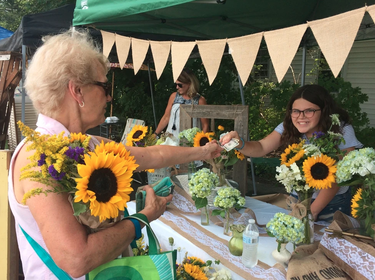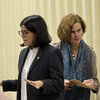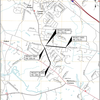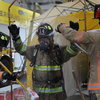Open Market is ‘a chance for all of Guilderland to come together,’ says Abraham
GUILDERLAND — When Scott Abraham read about farmers committing suicide, he decided to do something about it.
He read about families that had owned their farms for generations but couldn’t carry on. “It was just too tough … They can’t find help,” he says in this week’s Enterprise podcast.
He started a farmers’ market in Guilderland, near where he lived, and has a second market in Albany.
It’s a vital need for the community, Abraham says, to support local farmers while getting fresh produce and knowing where your food comes from.
He opened the original Guilderland market in 2018. Five years later, Abraham is starting a new venture: Meet Your Neighbors Open Market started this month and will run every Sunday in June from 10 a.m. to 2 p.m. as a “test run,” he said.
It’s in the same location as the original Guilderland Farmers’ Market, which opens in July — at the Guilderland Public Library, at 2228 Western Ave.
“It’s in this beautiful upper lot … away from other parking and there’s handicap parking,” said Abraham. “You couldn’t ask for a better spot or a better business to pair up with as the Guilderland Public Library. They’re amazing.”
The location, he said, brings together residents from three parts of town: those with Albany addresses, east of Crossgates Mall; those with Schenectady addresses west of the library; and those living towards Altamont and the Hilltowns.
The new Meet Your Neighbors Open Market, said Abraham, is “for people that really don’t have enough product to get into a farmers’ market for the whole season. It’s also for people that might just want to try out their hobby and see if vending might be a way to supplement their income.
“And it’s just a chance for all of Guilderland to come together,” he said, stressing that everybody is invited. That would include a chiropractor, an insurance agent, a dentist, he said “It’s a chance for the Guilderland community to come together and maybe meet your neighbors because Guilderland is so big.”
The pandemic shutdown made people relish face-to-face marketing and buying, Abraham said.
Fifty vendors have signed up for the June market so far, he said, and include home bakers, jewelry makers, and wood workers.
“Everyone wants to be me, me, me,” said Abraham, “but we have to learn to help each other …. You turn on the news and there are so many sad stories … but having a farmers’ market, a place for the community to meet … helps the farmers, helps small businesses, even helps little children get off the couch.”
All long, Abraham has helped children become entrepreneurs, from a girl selling flowers to a boy with Asperger’s. The first day that the boy was at the market, selling his art, “He couldn’t look people in the eye,” said Abraham. But he sold one of his paintings.
“The next day he came back, his hair was cut, he was talking to people. His mom’s crying, ‘Oh, my God, he never talks to people.’ It was just that one art sale that turned that kid around.”
Abraham himself was an entrepreneur as a boy.
He grew up “in a little condo community” in Tarrytown in Westchester County, a small community close to New York City.
“My father left before I was born so I never had a father figure in my life. So my mom is bringing me up … My mom always wanted me to work — and hopefully she’s not listening to this because she’ll probably get out the soap — but I had a paper route and my mom had this wonderful drawer of junk food.”
At the time, Abraham said, “Fruit roll-ups were all the thing. So, I started giving kids fruit roll-ups to deliver my papers.”
It took his mother a while to figure out why the roll-ups were disappearing so rapidly. When she found out he was handing them out to kids to do his delivery work, she said, “I’ve got a smart one, but you’re buying the roll-ups from now on.”
Abraham has organized events far larger than his farmers’ markets. When he lived in California, he said, he helped produce several large-scale events including a 2019 James Cameron Earth Day Avatar event that brought 4,000 inner-city kids into a Los Angeles theater to learn about ecology, meet James Cameron, and watch “Avatar”; he also co-produced the Earth Day on the Promenade in Santa Monica, which had about 20,000 visitors, that same year.
Abraham also was active in organizing events for 350.org, a global grassroots group committed to reducing use of fossil fuels. The name comes from the parts per million of carbon dioxide in the atmosphere, which the group explains was at 280 before the Industrial Revolution, was at 365 in 2002, and now is over 420 parts per million.
“The levels are rising at an alarming rate,” said Abraham who worked with a global team that helped mobilize over 5,200 actions in 181 countries in which groups of 10 to 1,500 people formed human collages of the number 350.
“Everything was uploaded to this big huge screen in Times Square and it was actually the biggest cumulative act of activists getting together doing one event globally, which was amazing,” he said.
A through line in Abraham’s life has been playing and coaching lacrosse. He learned the Native American game in high school and liked it better than playing baseball or football. “It’s like three or four sports combined into one game,” he said. Lacrosse never has a boring moment, he said.
Abraham played in college and coached at local high schools, eventually coaching at places around the world — including Greece, Croatia, and Israel.
Playing team sports is important for kids, teaching them social skills and “how to trust somebody else,” he said.
In California, Abraham coached a team at Mission Viejo High School, which he described as a “blue collar” community. Before he coached the team, Abraham said, it had never won half its games.
“When I got there, we only lost one game and we beat this team called the Pacific Palisades,” whose players, he said, lived in multi-million-dollar homes.
In Croatia, Abraham said, he coached at a medical college with students who had been unfamiliar with the sport. “We actually tied the best team … they don’t play tiebreakers which kind of kills me, but we actually tied the national team.”
Asked about the secret to his successful coaching, Abraham said, “It’s not really me. You have to find what each athlete has inside of them, and try to bring it out. All kids aren’t created equally …. But what I find is that I would rather have a kid with heart than an arrogant kid.”
He said of team play, “You’re only as good as your weakest link and you’re only as strong as your strongest link. So there’s a fine balance in there, but you have to find a way to bring that inner zone out to the kids and give them the confidence.”
Describing his coaching style, Abraham said, “I’m not going to rip you apart. When you come off the field, I’m going to ask you, ‘What did you do wrong?’” He contrasted that with a coach who would say, “You missed the shot; get down and do 20 push-ups.”
The best way, Abraham said, is to give someone confidence so they can succeed.



